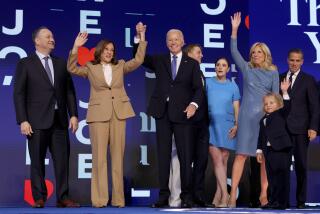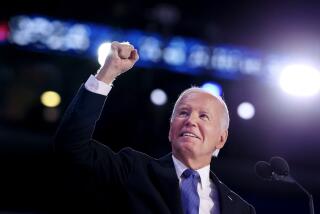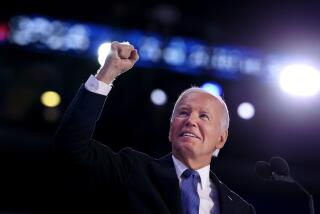Blair Bids Fellow Laborites Farewell
- Share via
LONDON — British Prime Minister Tony Blair took an emotional leave of his Labor Party on Tuesday with a speech that defended his transatlantic alliance with President Bush and touted his government’s achievements at home.
In an address that was frequently interrupted by applause and followed by a standing ovation, Blair acknowledged recent criticisms of his foreign policy. But he told delegates at the party’s annual conference in Manchester that battling terrorism meant entering into partnerships that were not easy “for a sovereign nation like Britain.”
“It’s hard sometimes to be America’s strongest ally. Europe can be a political headache,” he said in the televised remarks. “But there are not halfhearted allies of America today and no semidetached partners in Europe. And the truth is that nothing we strive for, from the world trade talks to global warming, to terrorism and Palestine, can be solved without America, or without Europe.”
Blair, 53, who announced this month that he would step down as party leader and prime minister before the next party conference in September 2007, began his address by offering thanks to “the Labor Party for giving me the extraordinary privilege of leading you these past 12 years.”
He also thanked his family, particularly his wife, Cherie, using humor in an attempt to ease controversy over a comment attributed to her. Bloomberg News quoted her Monday as muttering “that’s a lie” during an address by treasury chief Gordon Brown, Blair’s likely political heir, as Brown spoke of his warm ties with the prime minister.
“At least I won’t have to worry about her running off with the bloke next door,” Blair quipped. The Brown family lives in No. 11 Downing Street, next door to the prime minister’s official residence.
In a brief tribute, Blair said the party’s victories in the three last national elections “would never have been secured without Gordon Brown. He is a remarkable man, a remarkable servant of the people.”
Blair finished his tour of gratitude with a nod to the British people.
“Leaders lead, but in the end it’s people who deliver,” contributing to his government’s achievements since Labor seized power from the Conservatives in 1997, he said. It was people and not politics, he said, whose efforts had created new hospitals, schools, cities and businesses.
Long applause greeted his vow that Labor would achieve a fourth term in power in national elections to be held by 2009. Before then, Brown is expected to succeed Blair as party leader and prime minister.
Compared with 1997, Blair noted, Britain’s future had become more tightly bound to international politics, and that has brought new insecurities.
“Ten years ago, immigration was hardly raised and terrorism meant the IRA,” he said, referring to the Irish Republican Army. “Not anymore.
“Globalization, climate change, organized crime, suicide bombers born and bred in Britain who bring carnage to the streets of London in the name of religion” are just some of the issues he said are now facing Britons.
“The British people today are reluctant global citizens; I want them to be confident ones,” he said.
Britain could be still more competitive in areas such as technology, financial services and bio-science. “America does not want stem cell research. We do, we welcome it here,” he said.
The war on terrorism “is a struggle that I believe will last a generation or more,” he said, while rejecting the criticism that the U.S. and British military presence in Iraq and Afghanistan was encouraging Islamic militancy.
“This is not our war against Islam,” he added, “this is a war fought by extremists who pervert the true faith of Islam. It is not British soldiers who are sending car bombs into Baghdad or Kabul to slaughter the innocents.”
The Anglo-American alliance, and particularly Blair’s strong personal relationship with Bush, is still a stumbling block for the prime minister’s legacy, said Michael Cox, professor of international relations at the London School of Economics.
“For the first time since the Suez crisis of the ‘50s, foreign policy is a major issue behind the fall in a prime minister’s popularity,” Cox said. “It is a major cause of unease in the Muslim world.”
Yet there was little criticism offered by the party faithful Tuesday, despite recent complaints over both Blair’s foreign policy and his unwillingness to commit to a date for stepping down as prime minister.
Blair’s farewell was “highly emotional but not remotely sentimental,” said Charles Falconer, the lord chancellor. “He constantly challenged the party to move forward and face challenges like Middle East peace, the war on terror. We have all got to move to respond to these challenges.”
More to Read
Sign up for Essential California
The most important California stories and recommendations in your inbox every morning.
You may occasionally receive promotional content from the Los Angeles Times.










